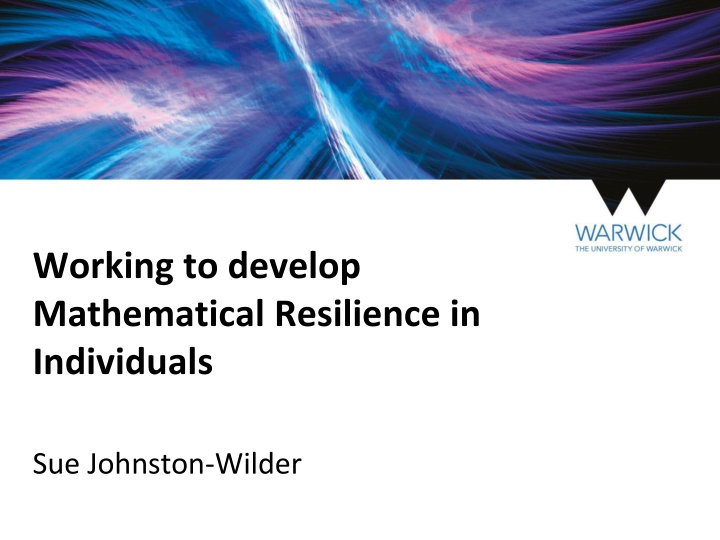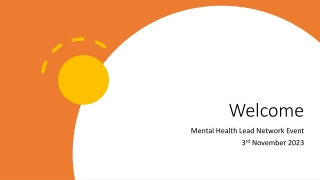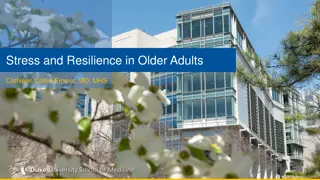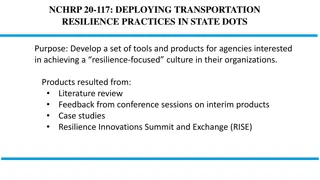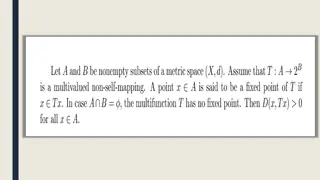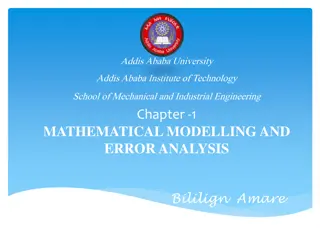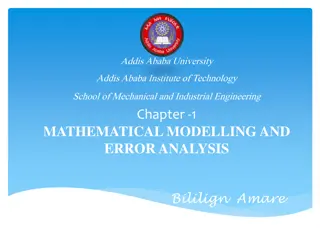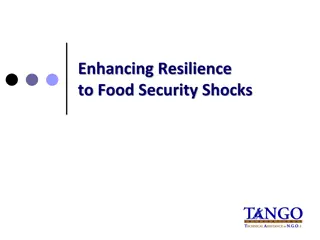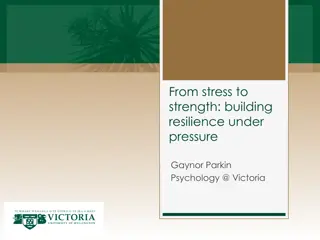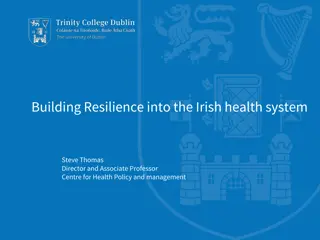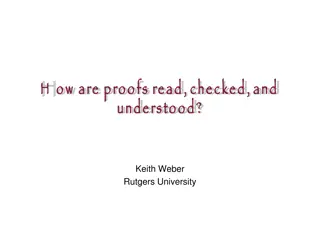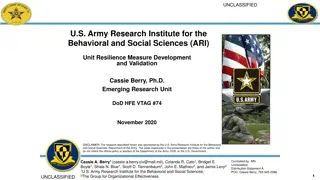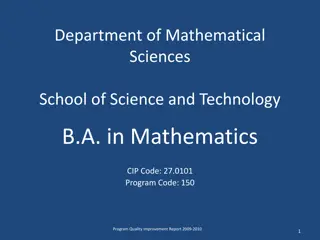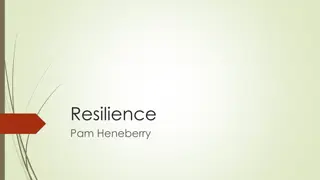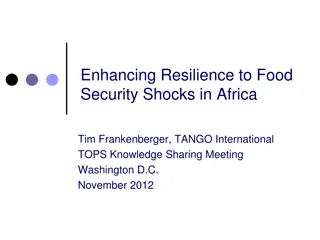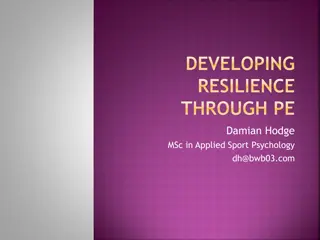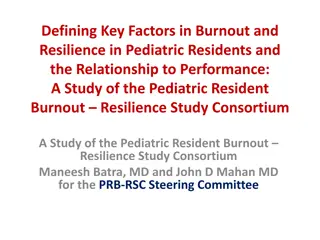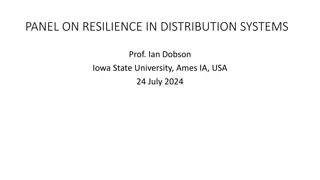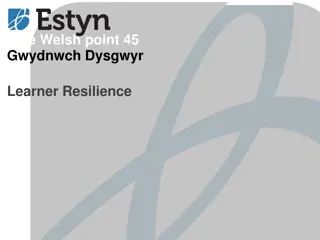Developing Mathematical Resilience in Individuals
Understanding that maths anxiety and avoidance are treatable, learners can develop strategies for re-inclusion in mathematics, progressing with skills for self-safeguarding within their local culture. Examples include courses and assessments that aim to increase mathematical resilience and reduce anxiety through effective teaching methods and personalized approaches.
Download Presentation

Please find below an Image/Link to download the presentation.
The content on the website is provided AS IS for your information and personal use only. It may not be sold, licensed, or shared on other websites without obtaining consent from the author.If you encounter any issues during the download, it is possible that the publisher has removed the file from their server.
You are allowed to download the files provided on this website for personal or commercial use, subject to the condition that they are used lawfully. All files are the property of their respective owners.
The content on the website is provided AS IS for your information and personal use only. It may not be sold, licensed, or shared on other websites without obtaining consent from the author.
E N D
Presentation Transcript
Working to develop Mathematical Resilience in Individuals Sue Johnston-Wilder
Key message? maths anxiety and avoidance are disabling and 'treatable'
What do we mean by treatable? Learners can develop strategies for re- inclusion in mathematics, and progressing with skills and awareness for self- safeguarding within a local culture that may or may not promote mathematical resilience.
For example: CfMR 24 hour course for 16 delegates: learning to listen exploring, options and action (Egan model) avoiding premature action goal setting and reviewing feedback strategies for approaching unfamiliar tasks reflections how to get out of the red zone (5/7 breathing)
CfMR Increased mathematical resilience Reduced maths anxiety
CfMR Mid-way assessment of A-level students: The value added [by CfMR] is +0.9 compared to a cohort average of +0.3.
For example, 1:1 exploring maths story (exclusion? harm? anticipation of harm?) explaining hand model of brain explaining exclusion, embarrassment, other social threats perceived as threats by brain growth zone model developing language of growth and panic zones
Developing the language of the growth zone model safe relaxed at ease complacent ... excited nervous engaged inquisitive ... frightened panicky anxious ...cf hand model
The growth zone model: amber zone New learning happens in the growth zone it should be safe to make mistakes, get stuck, require support, find activities challenging & tiring.
For example, 1:1 giving control continue or break working on some maths with control follow-up sessions, stay in touch
Hani PhD candidate Former primary school teacher Several disastrous attempts at SPSS course
Hani two problems (e.g., the absence of the teacher and the complexity of math as the result of discontinuity between the elementary and preparatory school in terms of math) I started to experience disability in math (please forgive me I could not put it other way).
Hani I felt that the teacher was talking a language, a totally foreign one, which I was not able to understand, grasp, or contribute to. I started to experience math alienation as I was a passive student at these classes I chose to carry on my studies at a faculty where there was no math at all.
Hani I think this way of avoiding math in my academic live resembles a body which is functioning with one kidney only. I could not do math not because I did not want to but the context played a huge role.
Hani transformed from feeling disabled to not completely skilful but a real beginner not a disabled one. with the potential to move forward like a child... I should have known that before annoying it is not difficult I just needed this help and I didn t get it when I needed it I feel stupid about it a bit sad that I didn't learn it before
Hani transformed Thinking in terms of the hand model of the brain, I start panicking My mind goes off line and I can't think about statistics at the time. First time, flip straight away I can't calm myself This time, it started to go offline. I asked questions, I was quicker, because of the book and the project I came to know some statistical descriptions and influences of one variable on the other
Molly Masters student Mum TA
Molly frightened I always remember him shouting I DONT CARE HOW THEY DO IT. THIS IS HOW I DO IT AND YOU WILL LEARN' Sometimes it felt like he had a point to prove in being able to get me to understand and that I was frustrating him by not. He would then get louder and louder as I start to retreat to my room. One point he even shot up out the chair and grabbed me round the back of the neck and aimed my head at the book and would shout LOOK!! I would be crying at this point and just want to hide away.
Molly no longer helpless The mere thought of having to do any form of maths that is not general addition just sends me to feeling like a child again. However, the trust I feel with Sue makes me feel like I could tackle anything, even though a little anxious at the maths. Sue started me off and I built my own tables square, noticing patterns in the numbers. My partner offered to help but I wanted to work on it on my own. I was enjoying it!
Anne Charity administrator Choosing AS, she wanted to study astrophysics But she hated the maths. She took AS additional maths and got a tutor outside school but that did not go very well and 'was too late'. She dropped maths, taking A2 in physics, french and English, and took a degree in politics.
Anne: not good enough I wasn t special enough to be in this gifted and talented [group] and I think that probably affects how you ... see yourself. You see yourself as more of an average student rather than an outstanding student.
Anne: times tables year 4 or year 5 teacher would kind of pick on people and ask them you know three nines are .. and you would have to answer that was just awful for me I absolutely hated that and it ... it just created that kind of panic it s kind of the humiliation factor of if you get asked and you don t know, everyone s going to laugh at you in that environment [it felt] as though you had to know it and if you didn t know it you were stupid. And I remember at that point I started to pretend because I think I was so preoccupied by this feeling of fear
Anne: back in maths classroom What was really interesting for me was observing myself doing this process of sort of panicking [her hand models flipping] of that part of the brain disengaging but actually being able to consciously notice that happening. And almost try to begin to put a pause in and see that happening hmm oh that s interesting but not let that take over and cloud the whole experience of being in the classroom.
Anne: back in maths classroom being back in that environment made me realise how important it was to be able to correct that [panicking]and not stay in that state of fear and threat and panic cos you d never gonna learn anything if you re feeling like that
